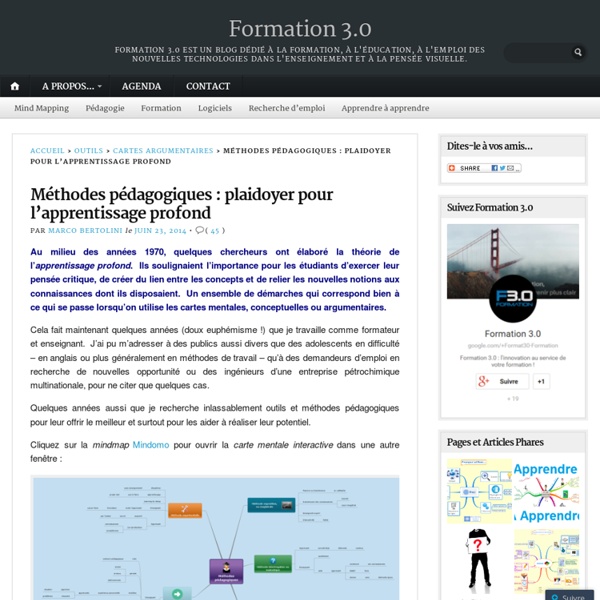



http://format30.com/2014/06/23/methodes-pedagogiques-plaidoyer-pour-lapprentissage-profond/
Related: méthodes pédagogiques • Former au 21e siècle • Learning styles • Neurosciences et éducation • tmoea19 Big and Small Classroom Management Strategies The year I started teaching seventh- to twelfth-grade English in Minneapolis, Prince launched his song about urban ruin, "Sign o' the Times." That song was an apt musical backdrop for the lives of my students, most of whom lived in poverty and challenged me daily. That year also afforded me the opportunity to be assaulted with a stone, two chairs, a Rambo knife, a seventh-grade girl's weak jab, and dozens of creative swear words. Fortunately, classroom order improved when I learned that successful classroom management depends on conscientiously executing a few big strategies and a lot of little ones.
Report Finds ‘Deeper Learning’ Model Improves Outcomes for All Students The conversation about what kids need to know and to be able to do by the end of high school has gradually shifted over the past several years to emphasize not just rigorous content goals, but also less tangible skills, such as creative thinking, problem-solving and collaboration. That shift has brought schools that are practicing “deeper learning” into focus. The William and Flora Hewlett Foundation has been a big supporter of this work, defining deeper learning as a model that focuses on critical thinking, communication, collaboration, academic mindsets and learning how to learn, all through rigorous content.
3 essential elements for successful online courses Coach Class Hi! I’m Paula. I have dyslexia, I love music, I play guitar and various other instruments. I have a terrible visual imagination, but I’m really hands on. The Importance of a Healthy Teacher Ego I have two primary messages for secondary school teacher training candidates. If you don't love adolescents and don't have a healthy ego, you should seriously consider finding another profession. You'll be living with these kids for 6-8 hours every day, and if you don't love them, the days will be long and difficult. And if you don't have good ego strength (or if your ego is strong in a less-than-ideal way), you'll find it difficult to deal with a multitude of challenges.
10 Easy Things to Try in Your Classroom in 2015 As we start the second half of the 2014-2015 school year hopefully you are feeling energized to try some new things. Here is a list of 10 suggestions: The furniture you have in your classroom helps to shape the culture of your classroom. Try tossing some of the desks and replace them couches, stand up bar tables, round tables, bean bags, etc… Create a space that invites more collaboration. Search is the new literacy.
academia V 19, Nb 3 / 200671 PerformaNce ImProVemeNt Quarterly, 19(3) PP. 0-00 Background hen I use a word,” Humpty Dumpty said inrather a scornul tone, “it means just what I choose it to mean—neither more nor less.” “Te question is,” said Alice, “whether you can makewords mean so many diferent things” New Teachers: A Primer on Assessment In order to effectively plan instruction, it’s important to determine students’ current level of knowledge and state of academic, social, and emotional skills. There are a variety of ways for teachers and students to arrive at this understanding and gauge student progress through assessment. View the video "Five Keys to Comprehensive Assessment" for a helpful overview of the various types and purposes of assessment. Then explore the resources below for tips and strategies to help you plan and craft assessments to guide teaching and learning in your classroom. After you have seen the video, make sure to read "The 5 Keys to Successful Comprehensive Assessment in Action" for a better understanding of what these elements look like in practice.
Dipsticks: Efficient Ways to Check for Understanding What strategy can double student learning gains? According to 250 empirical studies, the answer is formative assessment, defined by Bill Younglove as "the frequent, interactive checking of student progress and understanding in order to identify learning needs and adjust teaching appropriately." Unlike summative assessment, which evaluates student learning according to a benchmark, formative assessment monitors student understanding so that kids are always aware of their academic strengths and learning gaps.